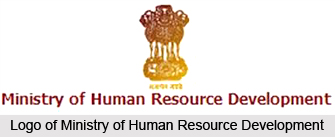 An Indian government ministry, the Ministry of Human Resources Development (HRD) is liable for the growth of human resources. The ministry is dissected into two departments, namely the Department of School Education and Literacy, which deals with primary education and literacy, and the Department of Higher Education, which supervises with secondary and post-secondary education.
An Indian government ministry, the Ministry of Human Resources Development (HRD) is liable for the growth of human resources. The ministry is dissected into two departments, namely the Department of School Education and Literacy, which deals with primary education and literacy, and the Department of Higher Education, which supervises with secondary and post-secondary education.
Ministers of cabinet rank of the Council of Ministers heads the Ministry of Human Resources Development. The present Minister of Human Resource Development is Arjun Singh. Two Ministers of State, assist the minister, one for each belong to the department, Ali Ashraf Fatmi is the Minister of State for School Education and Literacy and Daggubati Purandeswari (Minister of State for Higher Education).
Department of School Education and Literacy - This department is responsible for primary education, both formal and non-formal. Its stated objective is the Universalization of elementary education (UEE). The department evolved as the Indian Education Department in the 1910 under the supervision of British Raj. After independence, a full-fledged ministry, the Ministry of Education, was founded in 1947. The Ministry of Education later combined with the newly created Ministry of Human Resources Development in 1985. This department objects at achieving widespread access and enrollment, universal training of children up to 14 years of age, and substantial improvement in the quality of education to allow all children to achieve essential levels of learning.
Department of Higher Education - This department is in charge of secondary and post-secondary education. The activity of the Department is divided into six bureaus: University and Higher Education; Book Promotion and Copyrights; Minorities Education; Distance Education and Scholarships; International Cooperation, Administration, Technical Education; Planning and UNESCO, Coordination, Policy, Statistics, and Languages; and the Integrated Finance Division.
Most the work of the department of higher education is carried out through about 90 autonomous bodies that it directs:
| All India Council for Technical Education (AICTE), the three Indian Institutes of Science Education and Research (IISERs), the seven Indian Institutes of Technology (IITs), the six Indian Institutes of Management (IIMs), the four Indian Institutes of Information Technology (IIITs), the 20 National Institutes of Technology (NITs), the four National |
| Institutes of Technical Teachers` Training and Research (NITTTRs), and the four Regional Boards of Apprenticeship/Practical Training. |
| The three Deemed Universities in the field of Sanskrit (Rashtriya Sanskrit Sansthan (RSkS), New Delhi; the National Council for Promotion of Urdu Language (NCPUL); Shri Lal Bahadur Shastri Rashtriya Sanskrit Vidyapeeth (SLBSRSV), New Delhi; and Rashtriya Sanskrit Vidyapeeth (RSV), Tirupati), Kendriya Hindi Sansthan (KHS), Agra; the Central Institute of English and Foreign Languages (CIEFL), Hyderabad; and National Council for Promotion of Sindhi Language (NCPSL) |
| National Institute of Educational Planning and Administration (NIEPA) |
| National Commission for Minority Educational Institutions (NCMEI) |
| National Book Trust (NBT) |
| Attached Offices: Central Hindi Directorate, New Delhi; Commission for Scientific and Technical Terminology (CSTT), New Delhi; Central Institute of Indian Languages (CIL), Mysore |
| National Council of Educational Research and Training (NCERT) |
| Central Board of Secondary Education (CBSE) |
| Kendriya Vidyalaya Sangathan (KVS) |
| Navodaya Vidyalaya Samiti (NVS) |
| Central Tibetan School Administration (CTSA) |
| National Institute of Open Schooling (NIOS) |
| National Foundation for Teachers` Welfare |
The Ministry of Human Resources Development also operates inter-university centres:
| Consortium for Educational Communication (CEC) |
| Information and Library Network (INFLIBNET), Ahmedabad |
| Inter University Consortium for DAE Facilities, Indore |
| Nuclear Science Centre, New Delhi |
| National Assessment and Accreditation Council (NACC), Bangalore |
 An Indian government ministry, the Ministry of Human Resources Development (HRD) is liable for the growth of human resources. The ministry is dissected into two departments, namely the Department of School Education and Literacy, which deals with primary education and literacy, and the Department of Higher Education, which supervises with secondary and post-secondary education.
An Indian government ministry, the Ministry of Human Resources Development (HRD) is liable for the growth of human resources. The ministry is dissected into two departments, namely the Department of School Education and Literacy, which deals with primary education and literacy, and the Department of Higher Education, which supervises with secondary and post-secondary education.






